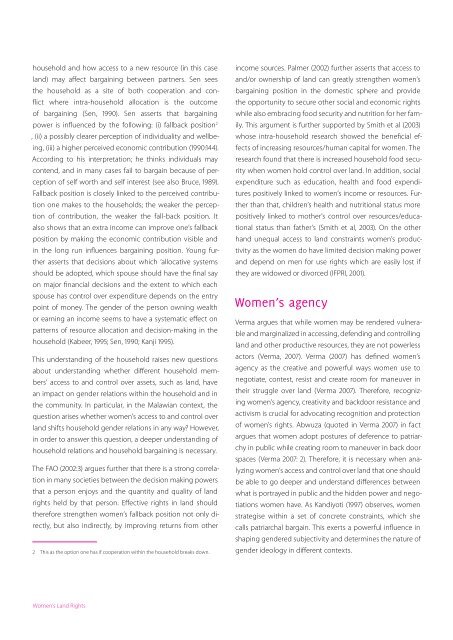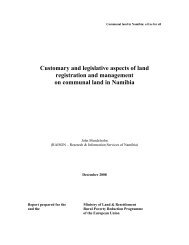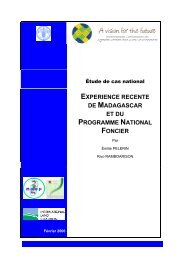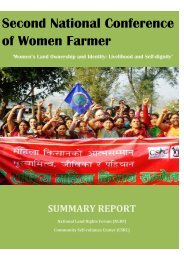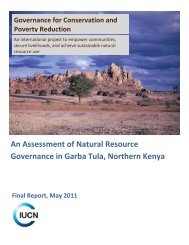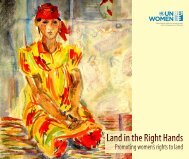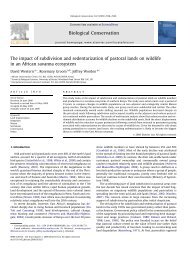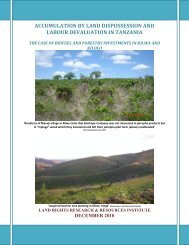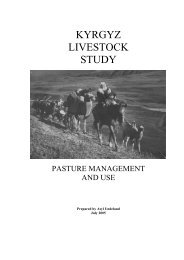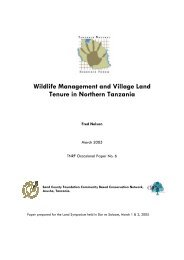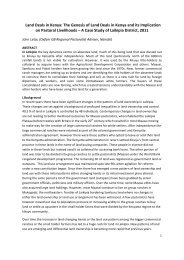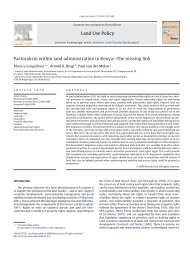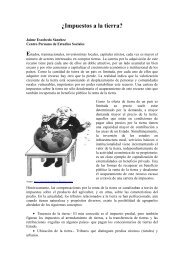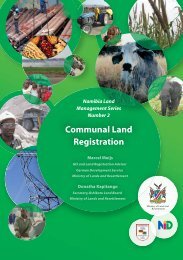Women's access to land and household bargaining power
Women's access to land and household bargaining power
Women's access to land and household bargaining power
You also want an ePaper? Increase the reach of your titles
YUMPU automatically turns print PDFs into web optimized ePapers that Google loves.
<strong>household</strong> <strong>and</strong> how <strong>access</strong> <strong>to</strong> a new resource (in this case<br />
<strong>l<strong>and</strong></strong>) may affect <strong>bargaining</strong> between partners. Sen sees<br />
the <strong>household</strong> as a site of both cooperation <strong>and</strong> con-<br />
flict where intra-<strong>household</strong> allocation is the outcome<br />
of <strong>bargaining</strong> (Sen, 1990). Sen asserts that <strong>bargaining</strong><br />
<strong>power</strong> is influenced by the following: (i) fallback position 2<br />
, (ii) a possibly clearer perception of individuality <strong>and</strong> wellbe-<br />
ing, (iii) a higher perceived economic contribution (1990:144).<br />
According <strong>to</strong> his interpretation; he thinks individuals may<br />
contend, <strong>and</strong> in many cases fail <strong>to</strong> bargain because of per-<br />
ception of self worth <strong>and</strong> self interest (see also Bruce, 1989).<br />
Fallback position is closely linked <strong>to</strong> the perceived contribu-<br />
tion one makes <strong>to</strong> the <strong>household</strong>s; the weaker the percep-<br />
tion of contribution, the weaker the fall-back position. It<br />
also shows that an extra income can improve one’s fallback<br />
position by making the economic contribution visible <strong>and</strong><br />
in the long run influences <strong>bargaining</strong> position. Young fur-<br />
ther asserts that decisions about which ‘allocative systems<br />
should be adopted, which spouse should have the final say<br />
on major financial decisions <strong>and</strong> the extent <strong>to</strong> which each<br />
spouse has control over expenditure depends on the entry<br />
point of money. The gender of the person owning wealth<br />
or earning an income seems <strong>to</strong> have a systematic effect on<br />
patterns of resource allocation <strong>and</strong> decision-making in the<br />
<strong>household</strong> (Kabeer, 1995; Sen, 1990; Kanji 1995).<br />
This underst<strong>and</strong>ing of the <strong>household</strong> raises new questions<br />
about underst<strong>and</strong>ing whether different <strong>household</strong> mem-<br />
bers’ <strong>access</strong> <strong>to</strong> <strong>and</strong> control over assets, such as <strong>l<strong>and</strong></strong>, have<br />
an impact on gender relations within the <strong>household</strong> <strong>and</strong> in<br />
the community. In particular, in the Malawian context, the<br />
question arises whether women’s <strong>access</strong> <strong>to</strong> <strong>and</strong> control over<br />
<strong>l<strong>and</strong></strong> shifts <strong>household</strong> gender relations in any way? However,<br />
in order <strong>to</strong> answer this question, a deeper underst<strong>and</strong>ing of<br />
<strong>household</strong> relations <strong>and</strong> <strong>household</strong> <strong>bargaining</strong> is necessary.<br />
The FAO (2002:3) argues further that there is a strong correla-<br />
tion in many societies between the decision making <strong>power</strong>s<br />
that a person enjoys <strong>and</strong> the quantity <strong>and</strong> quality of <strong>l<strong>and</strong></strong><br />
rights held by that person. Effective rights in <strong>l<strong>and</strong></strong> should<br />
therefore strengthen women’s fallback position not only directly,<br />
but also indirectly, by improving returns from other<br />
2 This as the option one has if cooperation within the <strong>household</strong> breaks down.<br />
Women’s L<strong>and</strong> Rights<br />
income sources. Palmer (2002) further asserts that <strong>access</strong> <strong>to</strong><br />
<strong>and</strong>/or ownership of <strong>l<strong>and</strong></strong> can greatly strengthen women’s<br />
<strong>bargaining</strong> position in the domestic sphere <strong>and</strong> provide<br />
the opportunity <strong>to</strong> secure other social <strong>and</strong> economic rights<br />
while also embracing food security <strong>and</strong> nutrition for her family.<br />
This argument is further supported by Smith et al (2003)<br />
whose intra-<strong>household</strong> research showed the beneficial effects<br />
of increasing resources/human capital for women. The<br />
research found that there is increased <strong>household</strong> food security<br />
when women hold control over <strong>l<strong>and</strong></strong>. In addition, social<br />
expenditure such as education, health <strong>and</strong> food expenditures<br />
positively linked <strong>to</strong> women’s income or resources. Further<br />
than that, children’s health <strong>and</strong> nutritional status more<br />
positively linked <strong>to</strong> mother’s control over resources/educational<br />
status than father’s (Smith et al, 2003). On the other<br />
h<strong>and</strong> unequal <strong>access</strong> <strong>to</strong> <strong>l<strong>and</strong></strong> constraints women’s productivity<br />
as the women do have limited decision making <strong>power</strong><br />
<strong>and</strong> depend on men for use rights which are easily lost if<br />
they are widowed or divorced (IFPRI, 2001).<br />
Women’s agency<br />
Verma argues that while women may be rendered vulnerable<br />
<strong>and</strong> marginalized in <strong>access</strong>ing, defending <strong>and</strong> controlling<br />
<strong>l<strong>and</strong></strong> <strong>and</strong> other productive resources, they are not <strong>power</strong>less<br />
ac<strong>to</strong>rs (Verma, 2007). Verma (2007) has defined women’s<br />
agency as the creative <strong>and</strong> <strong>power</strong>ful ways women use <strong>to</strong><br />
negotiate, contest, resist <strong>and</strong> create room for maneuver in<br />
their struggle over <strong>l<strong>and</strong></strong> (Verma 2007). Therefore, recognizing<br />
women’s agency, creativity <strong>and</strong> backdoor resistance <strong>and</strong><br />
activism is crucial for advocating recognition <strong>and</strong> protection<br />
of women’s rights. Abwuza (quoted in Verma 2007) in fact<br />
argues that women adopt postures of deference <strong>to</strong> patriarchy<br />
in public while creating room <strong>to</strong> maneuver in back door<br />
spaces (Verma 2007: 2). Therefore, it is necessary when analyzing<br />
women’s <strong>access</strong> <strong>and</strong> control over <strong>l<strong>and</strong></strong> that one should<br />
be able <strong>to</strong> go deeper <strong>and</strong> underst<strong>and</strong> differences between<br />
what is portrayed in public <strong>and</strong> the hidden <strong>power</strong> <strong>and</strong> negotiations<br />
women have. As K<strong>and</strong>iyoti (1997) observes, women<br />
strategise within a set of concrete constraints, which she<br />
calls patriarchal bargain. This exerts a <strong>power</strong>ful influence in<br />
shaping gendered subjectivity <strong>and</strong> determines the nature of<br />
gender ideology in different contexts.


